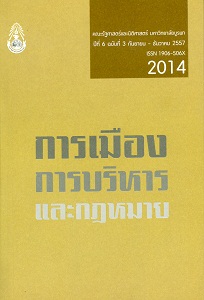แบบจำลองพฤติกรรมการมีส่วนร่วมทางการเมืองในการเลือกตั้งของนักศึกษาในสถาบันอุดมศึกษาในประเทศไทย
Abstract
การวิจัยนี้มีวัตถุประสงค์เพื่อ 1) ศึกษาพฤติกรรมการมีส่วนร่วมทางการเมืองในการเลือกตั้งของนักศึกษาในสถาบันอุดมศึกษาของไทย 2) พัฒนาแบบจำลองความสัมพันธ์เชิงสาเหตุของตัวแปรการถ่ายทอดทางการเมืองจากครอบครัว การถ่ายทอดทางการเมืองจากสถาบันการศึกษา การถ่ายทอดทางการเมืองจากสื่อมวลชน ความรู้ความเข้าใจทางการเมือง และความโน้มเอียงทางการเมืองที่ส่งผลต่อพฤติกรรมการมีส่วนร่วมทางการเมืองในการเลือกตั้งของนักศึกษา และ 3) ตรวจสอบความสอดคล้องของแบบจำลองความสัมพันธ์เชิงสาเหตุของตัวแปรที่ส่งผลต่อพฤติกรรมการมีส่วนร่วมทางการเมืองในการเลือกตั้งของนักศึกษาที่พัฒนาขึ้นกับข้อมูลเชิงประจักษ์ กลุ่มตัวอย่างเป็นนักศึกษาที่กำลังศึกษาอยู่ในระดับปริญญาตรี จำนวน 2,327 คน จากมหาวิทยาลัย 18 แห่ง เครื่องมือการวิจัยเป็นแบบสอบถามวัดความรู้ความเข้าใจทางการเมือง การถ่ายทอดทางการเมืองจากครอบครัว การถ่ายทอดทางการเมืองจากสถาบันการศึกษา การถ่ายทอดทางการเมืองจากสื่อมวลชน ความโน้มเอียงทางการเมือง และการมีส่วนร่วมทางการเมืองของนักศึกษา จำนวน 45 ข้อ วิเคราะห์ข้อมูลใช้สถิติเชิงพรรณนา ด้วยโปรแกรมสถิติสำเร็จรูป และวิเคราะห์ข้อมูลโดยใช้โปรแกรมลิสเรล (LISREL) ในการตรวจสอบความตรงเชิงโครงสร้างของแบบจำลองความสัมพันธ์เชิงสาเหตุ
ผลการวิจัยสรุปได้ว่า 1) ระดับความรู้ความเข้าใจทางการเมืองอยู่ในระดับสูง 2) ระดับการถ่ายทอดทางการเมืองจากครอบครัว จากสถาบันการศึกษา และจากสื่อมวลชน อยู่ในระดับมาก 3) ระดับความโน้มเอียงทางการเมืองด้านความสำนึกในหน้าที่พลเมือง ความไว้วางใจทางการเมืองและความรู้สึกมีสมรรถนะทางการเมืองอยู่ในระดับมาก 4) ระดับการมีส่วนร่วมทางการเมืองในการเลือกตั้งอยู่ในระดับปานกลาง 5) การวิเคราะห์แบบจำลองความสัมพันธ์เชิงสาเหตุของตัวแปรการถ่ายทอดทางการเมืองจากครอบครัว การถายทอดทางการเมืองจากสถาบันการศึกษา การถ่ายทอดทางการเมืองจากสื่อมวลชน ความรู้ความเข้าใจทางการเมือง และความโน้มเอียงทางการเมืองที่ส่งผลต่อพฤติกรรมการมีส่วนร่วมทางการเมืองในการเลือกตั้งของนักศึกษา พบว่า แบบจำลองมีความสอดคล้องกับข้อมูลเชิงประจักษ์อยู่ในเกณฑ์ดี ผลการทดสอบค่าไค-สแคว์มีค่าเท่ากับ 22.95 ที่องศาอิสระเท่ากับ 15 ค่าไค-สแควร์สัมพัทธ์ ( /df) เท่ากับ 1.53 ค่าความน่าจะเป็น (p-value) เท่ากับ .08 ดัชนีวัดระดับความกลมกลืน (GFI) มีค่าเท่ากับ .99 ดัชนีวัดระดับความกลมกลืนที่ปรับแก้แล้ว (AGFI) เท่ากับ .99 ดัชนีวัดความกลมกลืนเปรียบเทียบ (CFI) เท่ากับ .99 ค่ารากของค่าเฉลี่ยกำลังสองของเศษเหลือในรูปคะแนนมาตรฐาน (SRMR) เท่ากับ .01 ค่ารากของค่าเฉลี่ยกำลังสองของความคลาดเคลื่อนโดยประมาณ (RMSEA) เท่ากับ .01 ตัวแปรทั้งหมดในแบบจำลองสามารถอธิบายการมีส่วนร่วมทางการเมืองในการเลือกตั้งของนักศึกษาได้ร้อยละ 51 ผลการทดสอบสมมติฐานพบว่า 1)ความโน้มเอียงทางการเมืองได้รับอิทธิพลทางตรงจากความรู้ความเข้าใจทางการเมือง (DE=.25) การถ่ายทอดทางการเมืองจากครอบครัว (DE=.17) การถ่ายทอดทางการเมืองจากสถาบันการศึกษา (DE=.21) การถ่ายทอดทางการเมืองจากสื่อมวลชน (DE=.25) 2)การมีส่วนร่วมทางการเมืองในการเลือกตั้งได้รับอิทธิพลทางตรงจากความรู้ความเข้าใจทางการเมือง (DE=.45) และความโน้มเอียงทางการเมือง (DE=.38) และได้รับอิทธิพลทางอ้อมผ่านความโน้มเอียงทางการเมือง จากตัวแปรกความรู้ความเข้าใจทางการเมือง (IE=.10 ) การถ่ายทอดทางการเมืองจากครอบครัว (IE = .06) การถ่ายทอดทางการเมืองจากสถาบันการศึกษา (IE = .08) และการถ่ายทอดทางการเมืองจากสื่อมวลชน (IE = .09)
The Models of Political Participatory Behavior in Election of Students in Institutions of Higher Education in Thailand
The purpose of this research aims at: 1) studying the political participation behavior of Thai undergraduate students; 2) developing the causal relationship model on the political socialization from families, the political socialization from educational institutes, the political socialization from mass media, political understandings, and political affiliations affecting the political participation behavior in elections of undergraduate students; and 3) justifying the correlation between the causal relationship model affecting the political participation behavior in elections of undergraduate students, developed by an empirical data. Samples were derived from 2,327 undergraduate students from 18 universities. The research instrument is questionnaires with 45 questions testing political understanding, the political socialization from families, the political socialization from educational institutes, the political socialization from mass media, political affiliations and the political participations of undergraduate students. Data were analyzed by descriptive statistical analysis from LISREL by examining the causal relationship model.
The result indicates that 1) the level of political understanding is high; 2) the level of political socialization from families, from educational institutes, and from mass media are high; 3) the level of political affiliation in citizenship, in political satisfaction, and in political capability are high; 4) the level of political participation in elections is medium; 5) an analysis on the casual relationship model of the political socialization from families, the political socialization from educational institutes, the political socialization from mass media, political understandings, and political affiliations affecting the political participation behavior in elections of undergraduate students found that the model is consistent with test of goodness of fit equally Chi-Square ( ) =22.95, degrees of freedom (df) = 15, relative Chi-Square ( /df) = 1.53, probability (p-value) = .08, Goodness of Fit Index (GFI) =.99, Adjusted Goodness of Fit Index (AGFI) =.99, Comparative Fit Index (CFI) =.99, Standardized Root Mean Square Residual (SRMR) = .01, Root Mean Square Error of Approximation (RMSEA) = .01. All model variables indicated the political participation of student total 51 percents. The assumption test demonstrated that 1) the political affiliation is an direct result of the political understanding (DE=.25), the political socialization from families (DE=.17), the political socialization from educational institutes (DE=.21), the political socialization from mass media (DE=.25); 2) the political participation in elections is an direct result of the political understanding (DE=.45) and the political affiliation (DE=.38) as well as an indirect result through the political affiliation from the political understandings (IE=.10), the political socialization from families (IE=.06), the political socialization from educational institutes (IE=.08), and the political socialization from mass media (IE=.09).






